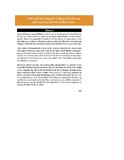| dc.contributor.author | Oladokun, O. | |
| dc.contributor.author | Aina, L. | |
| dc.date.accessioned | 2011-12-13T07:50:12Z | |
| dc.date.available | 2011-12-13T07:50:12Z | |
| dc.date.issued | 2011 | |
| dc.identifier.citation | Oladokun,O & Aina, L. (2011) ODL and the impact of digital divide on information access in Botswana, International Review of Research in Open and Distance Learning, Vol. 12, No. 6, pp.157–177 | en_US |
| dc.identifier.issn | 1492-3831 | |
| dc.identifier.uri | http://hdl.handle.net/10311/971 | |
| dc.description.abstract | Open and distance learning (ODL) has created room for the emergence of virtual education.
Not only are students found everywhere and anywhere undertaking their studies and earning
their degrees, but geographical boundaries between nations no longer appear to have
much relevance. As the new education paradigm irretrievably alters the way teaching and
learning is conducted, the application of modern educational ICTs has a major role to play.
With students of transnational or cross-border education dispersed into various nooks
and crannies of Botswana, many others enlist for the “home-baked” distance learning programmes
from their diverse locations. Like the face-to-face conventional students, distance
learners also have information needs which have to be met. But blocking the distance learners’
realization of their information needs is the digital divide, which further marginalizes
the underclass of “info-poor.”
The survey method was used, and a questionnaire administered to 519 students of four
tertiary level distance teaching institutions that met the criteria set for the study yielded a 70.1% response rate. The results showed that while the Government of Botswana has
made considerable effort to ensure country-wide access to ICT, which now constitutes an
effective instrument for meeting information needs, a number of problems still exist. The factors impeding easy access are unearthed. The findings of an empirical study portraying some learners as information-rich and others as information-poor, and the consequence of distance learners studying on both sides of the digital divide, are discussed. Suggestions on
bridging the digital divide are offered. | en_US |
| dc.language.iso | en | en_US |
| dc.publisher | Athabasca University Press, www.aupress.ca | en_US |
| dc.subject | Distance learners | en_US |
| dc.subject | Cross-border students | en_US |
| dc.subject | Digital divide | en_US |
| dc.subject | Information environment | en_US |
| dc.subject | ICTs | en_US |
| dc.subject | Data service providers | en_US |
| dc.subject | Library/librarian | en_US |
| dc.subject | Internet service providers | en_US |
| dc.title | ODL and the impact of digital divide on information access in Botswana | en_US |
| dc.type | Published Article | en_US |
| dc.link | http://www.irrodl.org/index.php/irrodl/article/view/1053/1995 | en_US |

